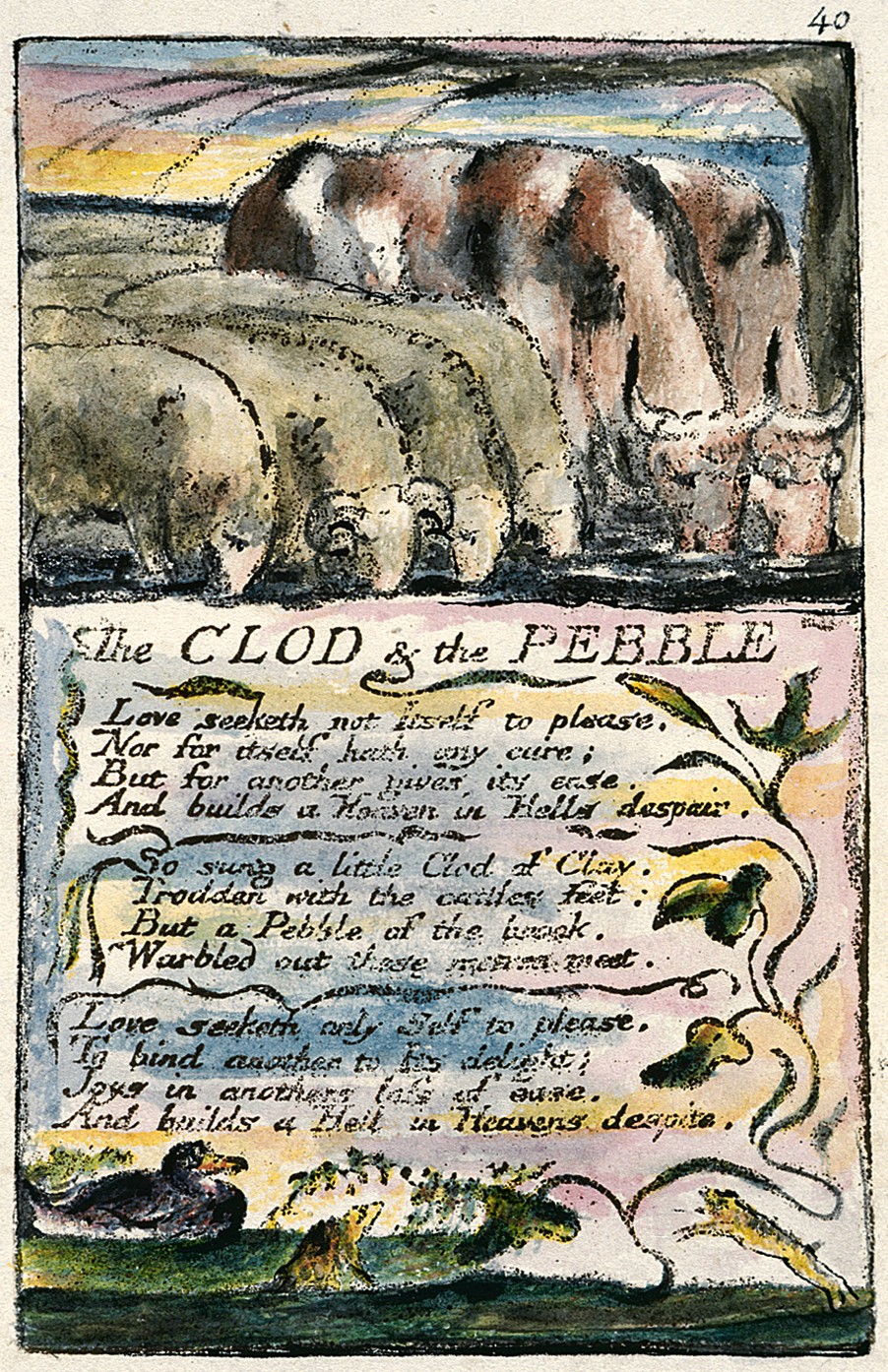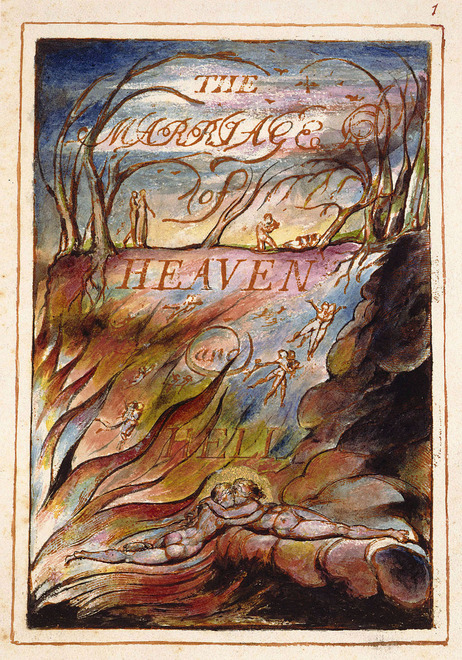.png) |
| Gates of Paradise Plate 15 |
Here is a quote from Canadian Christian Leaders website:
"The most important factor in Frye’s shift to literature was William Blake. 'I date everything,' he said in an interview at the end of his life, 'from my discovery of Blake as an undergraduate and graduate student.' He described a moment of insight that he had while writing a paper on Blake’s Milton, when 'suddenly the universe just broke open, and I’ve never been, as they say, the same man since.' At the centre of Blake’s vision, as Frye saw it, was the expansive energy and consciousness belonging to an imaginative vision of reality, a faith in the power of the arts to 'show us the human world that man is trying to build out of nature.'”
After studying English Literature at Oxford Frye returned to Canada and embarked on his career of teaching and writing literary criticism. This short passage from his first book, Fearful Symmetry, is an indication of the congruence of Frye's mind and Blake's mind. Because Frye was able to think like Blake thought, he could in his own way write like Blake wrote, although the two men concentrated their attention on their individual fields of endeavor.
Frye wrote: "The justification for Blake's kind of dehydrated epic is a simple matter of literary honesty. Poems must take their own forms, and these precipitates of meaning are the forms that poetry takes in Blake's crystallized mind. And epic of such forms cannot be expanded: it can only be padded, and padding is immoral...The beauty of Jerusalem is the beauty of intense concentration, the beauty of the Sutra, of the aphorisms which are the forms of so much of the greatest vision, of a figured bass indicating the harmonic progression of ideas too tremendous to be expressed by a single melody." Page 359
Perhaps by reading the following passages we can recognize some of the characteristics Frye points out as representative of Blake's technique of communication.
Auguries of Innocence, (E 495)
"He who Doubts from what he sees
Will neer Believe do what you Please
If the Sun & Moon should Doubt
Theyd immediately Go out
To be in a Passion you Good may Do
But no Good if a Passion is in you
The Whore & Gambler by the State
Licencd build that Nations Fate
The Harlots cry from Street to Street
Shall weave Old Englands winding Sheet
The Winners Shout the Losers Curse
Dance before dead Englands Hearse
Every Night & every Morn
Some to Misery are Born
Every Morn & every Night
Some are Born to sweet delight
Some are Born to sweet delight
Some are Born to Endless Night
We are led to Believe a Lie
When we see not Thro the Eye
Which was Born in a Night to perish in a Night
When the Soul Slept in Beams of Light
God Appears & God is Light
To those poor Souls who dwell in Night
But does a Human Form Display
To those who Dwell in Realms of day"
Songs of Experience, Song 42, (E 24)
"The Tyger.
Tyger Tyger, burning bright,
In the forests of the night;
What immortal hand or eye,
Could frame thy fearful symmetry?
In what distant deeps or skies.
Burnt the fire of thine eyes?
On what wings dare he aspire?
What the hand, dare sieze the fire?
And what shoulder, & what art,
Could twist the sinews of thy heart?
And when thy heart began to beat,
What dread hand? & what dread feet?
What the hammer? what the chain,
In what furnace was thy brain?
What the anvil? what dread grasp,
Dare its deadly terrors clasp!
When the stars threw down their spears
And water'd heaven with their tears:
Did he smile his work to see?
Did he who made the Lamb make thee?
Tyger Tyger burning bright,
In the forests of the night:
What immortal hand or eye,
Dare frame thy fearful symmetry?"
Letters, (E 728)
[To] Mr Butts, Grt Marlborough Street
Felpham April 25: 1803
My Dear Sir
...
And now My Dear Sir Congratulate me on my return to London
with the full approbation of Mr Hayley & with Promise--But Alas!
Now I may say to you what perhaps I should not dare to say
to any one else. That I can alone carry on my visionary studies
in London unannoyd & that I may converse with my friends in
Eternity. See Visions, Dream Dreams, & prophecy & speak Parables
unobserv'd & at liberty from the Doubts of other Mortals. perhaps
Doubts proceeding from Kindness. but Doubts are always pernicious
Especially when we Doubt our Friends Christ is very decided on
this Point. "He who is Not With Me is Against Me" There is no
Medium or Middle state & if a Man is the Enemy of my Spiritual
Life while he pretends to be the Friend of my Corporeal. he is a
Real Enemy--but the Man may be the friend of my Spiritual Life
while he seems the Enemy of my Corporeal but Not Vice Versa
What is very pleasant. Every one who hears of my going to
London again Applauds it as the only course for the interest of
all concernd in My Works. Observing that I ought not to be away
from the opportunities London affords of seeing fine Pictures and
the various improvements in Works of Art going on in London
But none can know the Spiritual Acts of my three years
Slumber on the banks of the Ocean unless he has seen them in the
Spirit or unless he should read My long Poem descriptive of those
Acts for I have in these three years composed an immense number
of verses on One Grand Theme Similar to Homers Iliad or Miltons
Paradise Lost the Person & Machinery intirely new to the
Inhabitants of Earth (some of the Persons Excepted) I have
written
this Poem from immediate Dictation twelve or sometimes twenty or
thirty lines at a time without Premeditation & even against my
Will. the Time it has taken in writing was thus renderd Non
Existent. & an immense Poem Exists which seems to be the Labour
of a long Life all producd without Labour or Study. I mention
this to shew you what I think the Grand Reason of my being
brought down here
I have a thousand & ten thousand things to say to you. My
heart is full of futurity. I percieve that the sore travel which
has been given me these three years leads to Glory & Honour. I
rejoice & I tremble "I am fearfully & wonderfully made". I had
been reading the cxxxix Psalm a little before your Letter
arrived. I take your advice. I see the face of my Heavenly
Father he lays his Hand upon my Head & gives a blessing to all my
works why should I be troubled why should my heart & flesh cry
out. I will go on in the Strength of the Lord through Hell will
I sing forth his Praises. that the Dragons of the Deep may praise
him & that those who dwell in darkness & on the Sea coasts may be
gatherd into his Kingdom. Excuse my perhaps too great
Enthusiasm. Please to accept of & give our Loves to Mrs Butts &
your amiable Family. & believe me to be----
Ever Yours Affectionately
WILL. BLAKE."
Psalms 139[1] O LORD, thou hast searched me, and known me.
[2] Thou knowest my downsitting and mine uprising, thou understandest my thought afar off.
[3] Thou compassest my path and my lying down, and art acquainted with all my ways.
[4] For there is not a word in my tongue, but, lo, O LORD, thou knowest it altogether.
[5] Thou hast beset me behind and before, and laid thine hand upon me.
[6] Such knowledge is too wonderful for me; it is high, I cannot attain unto it.
[7] Whither shall I go from thy spirit? or whither shall I flee from thy presence?
[8] If I ascend up into heaven, thou art there: if I make my bed in hell, behold, thou art there.
[9] If I take the wings of the morning, and dwell in the uttermost parts of the sea;
[10] Even there shall thy hand lead me, and thy right hand shall hold me.
[11] If I say, Surely the darkness shall cover me; even the night shall be light about me.
[12] Yea, the darkness hideth not from thee; but the night shineth as the day: the darkness and the light are both alike to thee.
[13] For thou hast possessed my reins: thou hast covered me in my mother's womb.
[14] I will praise thee; for I am fearfully and wonderfully made: marvellous are thy works; and that my soul knoweth right well.
[15] My substance was not hid from thee, when I was made in secret, and curiously wrought in the lowest parts of the earth.
[16] Thine eyes did see my substance, yet being unperfect; and in thy book all my members were written, which in continuance were fashioned, when as yet there was none of them.
[17] How precious also are thy thoughts unto me, O God! how great is the sum of them!
[18] If I should count them, they are more in number than the sand: when I awake, I am still with thee.
.






